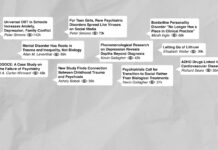De-privatizing Our Relationships
I’m glad we’re chipping away at the cracks in psychiatry and psychology and de-privatizing our lives.
Much of U.S. Healthcare Is Broken: How to Fix It (Chapter 2, Part 2)
Les Ruthven addresses the scientific literature on antidepressant efficacy and FDA approval.
Mad in America’s 10 Most Popular Articles in 2023
A roundup of Mad in America's most read blogs and personal stories of 2023 as chosen by our readers.
Dr. Gordon Warme: The Curious Case of an Unconventional Psychiatrist
Dr. Warme bucked convention, examining the cultural role that shamans, witch doctors, and placebo cures played in medicine.
Conservatorship: The Racket That Ruined My Father’s Last Years
I have watched as my father’s pursuit of happiness was swept away by the court system in his senior years.
Much of U.S. Healthcare Is Broken: How to Fix It (Chapter 2, Part 1)
Beginning the discussion on depression and antidepressant drugs. Are they as effective and safe as psychiatry claims?
Not Just a Dream: Finding the Mental Health Community I’d Been Longing For
I dreamed of a place where healers weren’t afraid of intense states like madness. They embraced it; maybe they’d been through it themselves.
Therapy by Script Undermines Healing; Connection Is the Key
Healing from our deepest wounds comes through being in connection with people who cherish us and take us seriously.
Reimagining Crisis Support: A Conversation with Tina Minkowitz
The mental health system is always trying to get more resources for itself, insinuate itself into every aspect of life, subsuming every aspect of the fulfillment of human rights.
Much of U.S. Healthcare Is Broken: How to Fix It (Chapter 1, Part 3)
About healthcare's focus on back end treatment rather than front end treatment: treating the symptoms rather than the causes of the health condition.
How the Medical Model Corrupted Mennonite Values
How to square the violent restraint and isolation of a vulnerable patient with the empowering, pacifist values of the hospital's founders?
The Power Dynamics of Psychedelic Therapy
I want people who have gone through psychedelic therapy to not feel alone if they felt silenced, controlled, or interpersonally hurt.
Q&A: What Is Executive Function, and How Can Parents and Teachers Help Kids Focus?
Ask anyone who’s ever taught kids, and they’ll tell you a story about one student who sticks in their memory.
Much of U.S. Healthcare Is Broken: How to Fix It (Chapter 1, Part 2)
Les Ruthven addresses off-label prescribing as well as physicians’ anti-science pushback against the use of well-conducted clinical trials.
Beyond Pills: UK Parliament Must Support Social and Psychological Services Instead
Davies calls on the UK Parliament to support the Beyond Pills initiative, and follow the evidence to put social and psychological help first.
Mental Disorder Has Roots in Trauma and Inequality, Not Biology
The scientific evidence is of social/psychological, not biological, causation: negative environmental conditions, not disease.
A Remarkable Feat: A Psychiatric Patient Changed the Law on Restraints
The case of Silas Dam obliged the Danish government to increase rights for psychiatric patients subjected to belt restraints.
Much of U.S. Healthcare Is Broken: How to Fix It (Chapter 1, Part 1)
On the difference between basing a medical system on clinical belief versus one based on scientific evidence.
Decolonizing Psychiatry in Pakistan: A Reckoning with our Colonial Past and a Call for...
Psychiatrist Yousaf Raza details the problems with psychiatric health care in Pakistan and shows how to find a way forward.
The Drug Taper Paradox
When we look to pills to solve one problem, we forget the opponent processes the body will naturally employ to return to homeostasis.
The Lie That Antidepressants Protect Against Suicide Is Deadly
Antidepressants do not protect against suicide. According to placebo-controlled trials, they double the risk of suicide.
Much of U.S. Healthcare Is Broken: How to Fix It (Preface)
Medical practitioners base their practice on clinical experience, rather than the sound published health research, which they distrust.
Pigs in the Hospital: The Collapse of Venezuela’s Mental Health System
The directors of the hospital, considering the empty spaces provided by its lack of services, decided to allow “milicianos” to move in, along with their pigs.
Psychiatry, Violence, and the State: California’s Systematic Failure of Its Unhoused Population
California has decided to systematically restrain, incarcerate, forcibly strip, and drug its now sizable unhoused population.
Withdrawing From Psychiatric Drugs: How to Produce Smaller Doses Than Those the Drug Companies...
Peter Gøtzsche: To reduce the risk of withdrawal symptoms, it is necessary to respect the form of the binding curve.

































